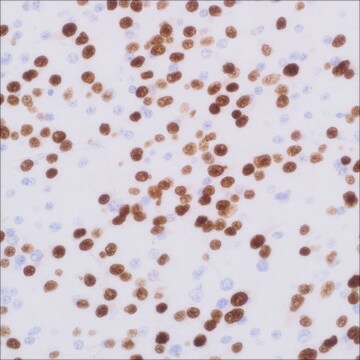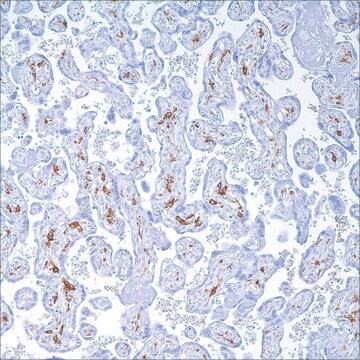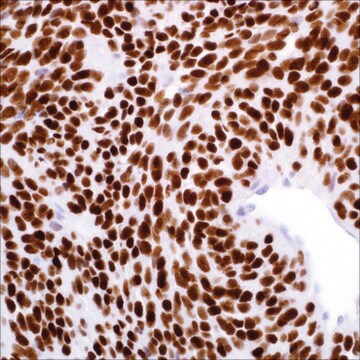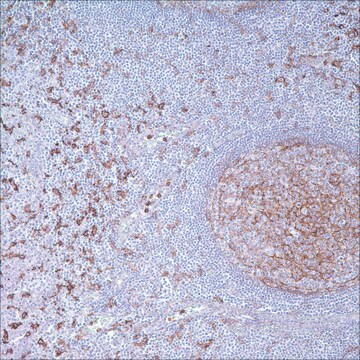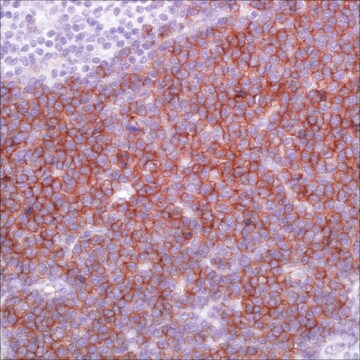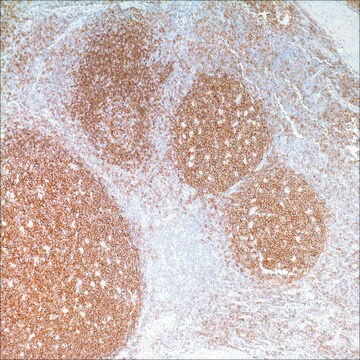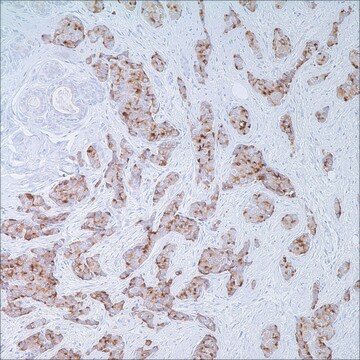254M-1
FLI-1 (MRQ-1) Mouse Monoclonal Antibody
About This Item
Produits recommandés
Source biologique
mouse
Niveau de qualité
100
500
Conjugué
unconjugated
Forme d'anticorps
culture supernatant
Type de produit anticorps
primary antibodies
Clone
MRQ-1, monoclonal
Description
For In Vitro Diagnostic Use in Select Regions (See Chart)
Forme
buffered aqueous solution
Espèces réactives
human
Conditionnement
vial of 0.1 mL concentrate (254M-14)
vial of 0.5 mL concentrate (254M-15)
bottle of 1.0 mL predilute (254M-17)
vial of 1.0 mL concentrate (254M-16)
bottle of 7.0 mL predilute (254M-18)
Fabricant/nom de marque
Cell Marque™
Technique(s)
immunohistochemistry (formalin-fixed, paraffin-embedded sections): 1:25-1:100
Isotype
IgG2b
Contrôle
pnet
Conditions d'expédition
wet ice
Température de stockage
2-8°C
Visualisation
nuclear
Informations sur le gène
human ... FLI1(2313)
Description générale
The FLI-1 gene and FLI-1 protein are best known for their critical role in the pathogenesis of ES/PNET. More than 85% of ES/PNET are characterized by the translocation t(11;22)(q24;q12) that results in the fusion of the ews gene on chromosome 22 to the FLI-1 gene on chromosome 11. FLI-1 is a member of the ETS (erythroblastosis virus-associated transforming sequences) family of DNA-binding transcription factors and is involved in cellular proliferation and tumorigenesis. FLI-1 is normally expressed in endothelial cells and in hematopoietic cells, including T lymphocytes. The immunohistochemical detection of FLI-1 protein has been shown in two recent studies to be valuable in the discrimination of ES/PNET from most of its potential mimics, with the notable exception of lymphoblastic lymphoma.
The FLI-1 gene has also recently been shown to play an important role in the embryologic development of blood vessels. Expression of FLI-1 protein in adult endothelial cells in all types of blood vessels (arterial, venous, and lymphatic) has previously been shown both in our previous work and in that of Nilsson et al.
Folpe et al. found FLI-1 to be a highly sensitive (92%) and, with regards to the cases evaluated in this study, specific (100%) marker of both benign and malignant vascular tumors. The “absolute specificity” of FLI-1 is of course lower, given its expression in ES/PNET and lymphomas. FLI-1 expression appears to be the first reliable nuclear marker of endothelial differentiation. In particular, Folpe et al. found that FLI-1 reliably distinguished epithelioid forms of angiosarcoma from two important mimics, epithelioid sarcoma and carcinoma.
Assoc. products: WT-1, CD99, Synaptophysin, Chromogranin A, CK AE1/AE3
Qualité
 IVD |  IVD |  IVD |  RUO |
Liaison
Forme physique
Notes préparatoires
Autres remarques
Informations légales
Vous ne trouvez pas le bon produit ?
Essayez notre Outil de sélection de produits.
Contrôle
Certificats d'analyse (COA)
Recherchez un Certificats d'analyse (COA) en saisissant le numéro de lot du produit. Les numéros de lot figurent sur l'étiquette du produit après les mots "Lot" ou "Batch".
Déjà en possession de ce produit ?
Retrouvez la documentation relative aux produits que vous avez récemment achetés dans la Bibliothèque de documents.
Notre équipe de scientifiques dispose d'une expérience dans tous les secteurs de la recherche, notamment en sciences de la vie, science des matériaux, synthèse chimique, chromatographie, analyse et dans de nombreux autres domaines..
Contacter notre Service technique